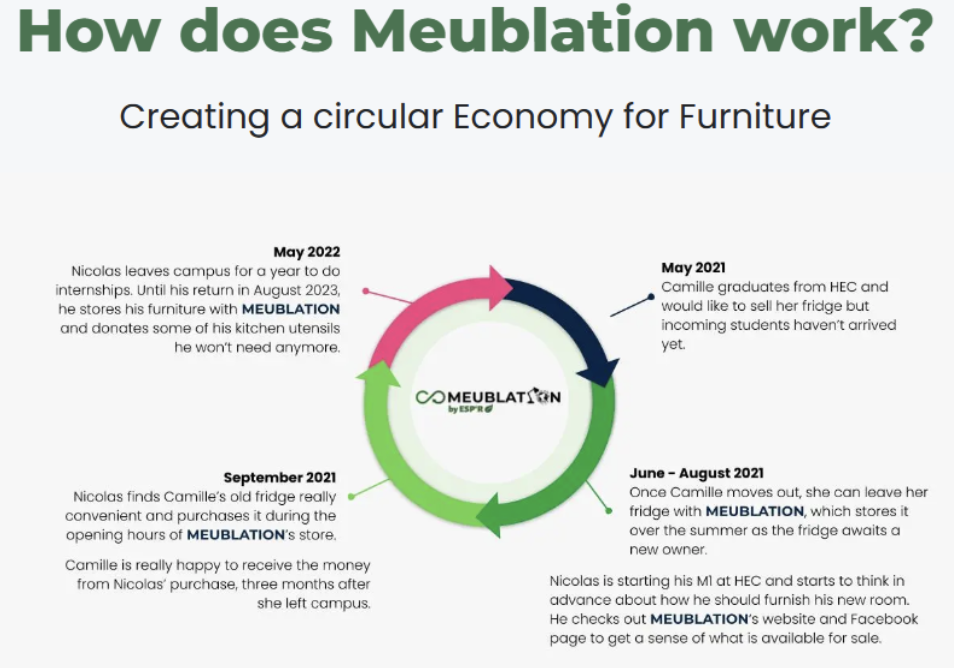How HEC Paris’s ‘La Meublation’ is Pioneering a Cheaper and Greener Future on Campus
Founded in 2019 as part of Esp’R, HEC Paris’s green association, La Meublation emerged as a direct response to a waste problem on campus. Annually, approximately 7 tons of furniture and appliances were discarded by students, which was unsustainable. Meublation vowed to change this, operating on a simple yet impactful goal: to extend the life cycle of furniture by creating a platform for buying, selling, storing, and donating. This directly addresses the annual disposal of reusable furniture and appliances, reducing CO2 emissions.
I spoke to Marine, the treasurer of La Meublation, and she explained that it operates through two primary services that cater specifically to the needs of HEC students. First, they host open days at the beginning and end of each semester, allowing students to sell unwanted furniture on their platform. This can be anything from chairs to lamps to drying racks. Students can sell items by setting a price, uploading a photo, and providing a description, thereby connecting sellers to buyers. Sellers set their prices, with Meublation transferring 90% of the proceeds back to the seller, retaining just a 10% commission to cover insurance, expenses, and service improvements. Items are stored in a massive shipping container in one of the buildings’ basements. For unsold products after two years, Meublation donates them to charities like Les Ressourceurs in Jouy-en-Josas (the local village) or organizations supporting refugees, ensuring that no item goes to waste.
La Meublation also offers a storage service, recognizing the needs of its international student population. This service provides a solution to many people who stay on campus for only a year or less and lack storage options. I, myself, will be using this service at the end of May. This mitigates the loss of furniture between academic years and reduces the need for shipping, making it a practical and sustainable choice.
The initiative’s success is largely due to the support from the HEC Paris administration, which helps marketing efforts and bolsters confidence in Meublation’s services. For example, the initiative is integrated into the academic calendar ensuring that new students know about the platform even before they arrive on campus.
Despite its success, as evident by some of the numbers in Figure 3, La Meublation faces a challenge: the demand outweighs its current capacity, especially at the end of the year when most students are transitioning. To address this, they plan to acquire a third container, emphasizing the scalability of this sustainable model to other campuses.
Envisioning the scalability of this model, the potential application at universities worldwide is clear. La Meublation's solutions resonate with the broader struggle against waste and the push for sustainability. Implementing a similar program at NYU would address environmental concerns and foster a sense of community and a culture of sustainability on campus. The success of such an initiative will hinge on effective communication, administrative support, and a collective commitment to change. And, of course, finding space for a shipping container in Manhattan.
Biography: I’m Marine, from Paris. After 2 years of literary and economic French “Classes préparatoires,” I joined HEC in the Master in Management program in 2022. I’m an active member of ESP’R, the green club of HEC, and happy to contribute to the concrete reduction of the impact of the campus through Meublation. Alongside my interest in environmental issues, I love reading, and I dance in a student musical! I plan to work in public institutions on economic and environmental issues.




